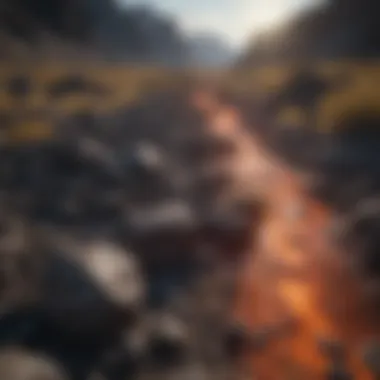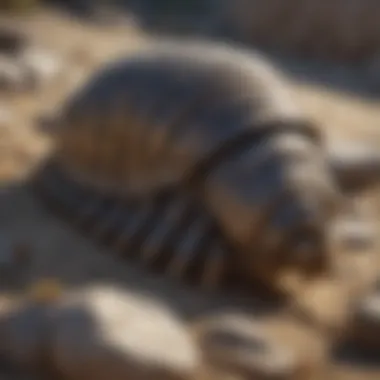Unveiling the Enigmatic Universe of Idaho Rocks: A Geological Odyssey


Rock and Fossil Identification
As we embark on our journey to explore the captivating world of Idaho rocks, it is imperative to first delve into the realm of rock and fossil identification. Idaho is renowned for its diverse array of geological wonders, from ancient fossils to intricate rock formations, enticing rock and fossil enthusiasts from far and wide. Understanding the types of rocks and fossils found in Idaho is crucial for any collector. Whether you are hunting for valuable specimens or seeking to unravel the mysteries of the past through fossils, familiarity with the characteristics to look for in these geological treasures will enhance your exploration experience. Utilizing specialized tools for identification, such as magnifying lenses and hardness tests, can aid in distinguishing between different rock types and fossils, providing a deeper insight into Idaho's rich geological heritage.
Introduction
Idaho boasts a rich tapestry of geological marvels that beg exploration and analysis. From ancient rock formations to valuable fossils, the state's landscape is a treasure trove for enthusiasts seeking to uncover the secrets of the earth's history. This article aims to delve into the intricacies of Idaho's rocks, shedding light on the diverse array of formations that make it a playground for rock and fossil aficionados. Join us as we embark on a journey through time and geology in the fascinating world of Idaho rocks.
Idaho's Geological Riches
The Formation of Idaho Rocks
Idaho's rocks bear witness to a complex history etched in their very composition. Over millions of years, geological forces have sculpted these rocks into the varied landscape we see today. The interplay of tectonic activity, volcanic eruptions, and sedimentary deposition has endowed Idaho's rocks with a unique character that intrigues scientists and enthusiasts alike. Understanding the formation of Idaho rocks provides a key to unlocking the state's geological heritage and deciphering the events that shaped its land.
The Diversity of Idaho's Geological Landscape
Idaho's geological landscape is a canvas painted with a multitude of hues, each representing a different chapter in the state's geological saga. From the rugged Sawtooth Mountains to the volcanic plains of Craters of the Moon, Idaho offers a smorgasbord of geological wonders waiting to be unraveled. This diversity not only showcases the richness of Idaho's geological history but also provides valuable insights into the evolution of its terrain over millennia.
Significance of Idaho Rocks
Rocks as a Window to the Past
Rocks in Idaho serve as portals to a bygone era, preserving within their layers a chronicle of past environments and life forms. By studying these rocks, researchers can piece together the puzzle of Idaho's ancient landscapes and the creatures that once roamed its territories. Delving into rocks as a window to the past offers a glimpse into a world long gone, bridging the gap between contemporary Idaho and its geological history.
Idaho's Contribution to Fossil Discovery
Idaho has emerged as a hotspot for fossil discovery, unearthing prehistoric treasures that rewrite the narrative of Earth's history. The state's unique geology has preserved fossils with exceptional detail and abundance, enriching scientific knowledge and delighting fossil enthusiasts. Idaho's contribution to fossil discovery not only sheds light on ancient life forms but also cements its position as a key player in paleontological research worldwide. Let's unravel the secrets these fossils hold and appreciate Idaho's role in uncovering Earth's past in the most remarkable way.
Idaho's Unique Rock Formations
Idaho's Unique Rock Formations play a crucial role in showcasing the diverse and captivating geological wonders that the state has to offer. From the Sawtooth Mountains to Hell's Canyon and Craters of the Moon National Monument, each formation holds unique characteristics that appeal to both enthusiasts and researchers. These formations not only present a visual treat but also serve as valuable educational resources for understanding the geological history and processes that have shaped Idaho's landscape.
Sawtooth Mountains


Overview of the Sawtooth Range
The Sawtooth Range stands out as a prominent geological feature in Idaho, known for its jagged peaks and rugged terrain. This range offers a remarkable glimpse into the state's geological history, with its diverse rock formations and distinct topography. The Sawtooth Mountains' strategic location provides researchers and visitors with insights into various geological processes, making it an essential inclusion in any geological exploration of Idaho.
Geological Marvels Found in Sawtooth Mountains
The Geological Marvels Found in Sawtooth Mountains include notable formations such as ancient rock layers, intricate sedimentary patterns, and evidence of past volcanic activities. These marvels not only serve as a testament to the region's geological evolution but also offer opportunities for scientific study and appreciation of nature's wonders. Exploring these geological marvels provides enthusiasts with a deeper understanding of Idaho's unique geological heritage and the forces that have shaped the Sawtooth Mountains over millennia.
Hell's Canyon
Geological Features of Hell's Canyon
Hell's Canyon boasts a diverse array of geological features, including dramatic cliffs, winding rivers, and exposed rock formations. These features offer a glimpse into the region's complex geological past, with sedimentary layers and mineral deposits revealing intriguing details about ancient environments and land formations. Studying the geological features of Hell's Canyon provides valuable insights for researchers and collectors interested in unraveling Idaho's geological history.
Rare Rocks and Fossils in the Canyon
Hell's Canyon is home to a plethora of rare rocks and fossils that have captured the attention of geologists and collectors alike. These unique specimens offer a treasure trove of information about past ecosystems, climate conditions, and geological events in the region. Collecting and studying these rare rocks and fossils in Hell's Canyon contribute significantly to expanding our knowledge of Idaho's geological diversity and the extensive range of specimens that can be found in this natural wonder.
Craters of the Moon National Monument
Volcanic Origins of Craters of the Moon
The Craters of the Moon National Monument present a fascinating display of Idaho's volcanic origins, with vast lava fields, volcanic caves, and cinder cones dotting the landscape. These volcanic features showcase the state's tumultuous geological past, highlighting the volcanic activity that has shaped the region over time. Exploring the volcanic origins of Craters of the Moon provides a unique opportunity to witness firsthand the powerful forces of nature and the lasting impact of volcanic processes on Idaho's geological composition.
Unique Rock Formations in the Monument
Within the Craters of the Moon National Monument, visitors can encounter a myriad of unique rock formations, including twisted lava formations, spatter cones, and lava tubes. These distinctive features offer a visual spectacle and a learning experience for rock and fossil enthusiasts, illustrating the variety of geological formations that can arise from volcanic activity. The unique rock formations in the monument not only serve as geological attractions but also as reminders of the dynamic nature of Idaho's landscape and the ongoing geological processes that continue to shape its terrain.
Precious Gems of Idaho
Idaho, a geological treasure trove, not only boasts fascinating rocks but also harbors an abundance of precious gems that captivate enthusiasts. The significance of precious gems in Idaho lies in their unique formation processes, which set them apart from rocks and fossils. These gems offer a remarkable insight into the region's geological history, showcasing the diverse mineral compositions that have evolved over millennia.
Star Garnets
Formation and Characteristics of Star Garnets


Exploring the formation and characteristics of star garnets reveals a mesmerizing process where these gems acquire their distinctive star-like appearance due to inclusions of rutile within their crystalline structure. This not only enhances their aesthetic appeal but also adds to their value as coveted gems. The striking feature of star garnets is their optical phenomenon known as asterism, where under light, a stunning star-shaped pattern emerges, making them highly sought after by collectors and jewelers alike.
Where to Find Star Garnets in Idaho
Delving into the hunt for star garnets in Idaho unveils specific locations rich in these exquisite gems. Emerald Creek in the Idaho Panhandle National Forests stands out as a prominent site for star garnet prospecting, offering enthusiasts a chance to uncover these treasures in their natural geological setting. The advantageous aspect of these locations lies in the accessibility they provide to rock and gem enthusiasts, allowing for a rewarding and educational experience in gemstone hunting.
Opals
Different Types of Opals Found in Idaho
Idaho is home to a variety of opals, each with its distinct characteristics and allure. From precious black opal to fiery Mexican opal, these gems exhibit a wide range of colors, patterns, and play of colors. The advantage of exploring different types of opals in Idaho lies in the opportunity to witness nature's artistic craftsmanship firsthand, with each opal showcasing a unique beauty that appeals to collectors and connoisseurs.
Popular Opal Mining Sites
Unveiling the popular opal mining sites in Idaho sheds light on locations like Spencer Opal Mines, where enthusiasts can try their hand at digging for these mesmerizing gems. The advantage of these sites is the potential for discovering high-quality opals while immersing oneself in the thrill of gemstone prospecting. By visiting such sites, collectors can delve into the world of opal mining, gaining insights into geology and lapidary practices that enrich their appreciation for these precious stones.
Fossil Discoveries in Idaho
In this segment of the article, we will delve into the significant realm of Fossil Discoveries in Idaho. The exploration of fossils in Idaho unveils a rich tapestry of ancient life forms that have been impeccably preserved over geological eras. Idaho's Fossil Discoveries serve as windows to the past, offering invaluable insights into the prehistoric world. Fossils found in Idaho not only contribute to scientific research but also aid in understanding the state's geological evolution and ecosystem transformations.
Ancient Life Preserved in Idaho
Overview of Fossil Sites in Idaho
The Overview of Fossil Sites in Idaho presents an extraordinary array of geological wonders waiting to be unraveled. These sites encapsulate a diverse range of fossils, dating back millions of years, providing a comprehensive historical archive for researchers and enthusiasts alike. The key characteristic of Fossil Sites in Idaho lies in their exceptional preservation conditions, which have resulted in the fossilization of a wide variety of species. This aspect makes these sites highly desirable for paleontologists and historians, contributing significantly to the scientific community's treasure trove of knowledge.
Key Fossil Discoveries in the State
Key Fossil Discoveries in the State encompass remarkable findings that hold immense significance in the field of paleontology. These discoveries shed light on extinct species, climate patterns, and geological events that have shaped Idaho's landscape over aeons. The standout feature of Key Fossil Discoveries in the State is their rarity and scientific importance, with many findings representing unique or previously undiscovered species. These fossils offer crucial insights into ancient ecosystems, painting a vivid picture of Idaho's prehistoric past and its enthralling biodiversity.
Fossil Identification and Preservation
Methods for Identifying Fossils
Methods for Identifying Fossils play a pivotal role in the excavation and study of ancient remains found in Idaho. These techniques enable researchers to classify, analyze, and categorize fossil specimens with precision and accuracy. The key characteristic of these identification methods is their systematic approach, which combines morphology, anatomy, and other scientific disciplines to determine the origins and characteristics of fossilized organisms. By employing these methods, experts can unravel the mysteries encapsulated within Idaho's fossil record, enriching our understanding of the state's geological history.


Best Practices for Fossil Preservation
Best Practices for Fossil Preservation are essential to safeguarding and maintaining the integrity of fossil specimens discovered in Idaho. These practices emphasize meticulous handling, storage, and documentation to ensure the longevity and authenticity of fossils over time. The key characteristic of fossil preservation methods is their focus on preventing degradation and damage, allowing future generations of scientists to study these invaluable artifacts. By adhering to best practices, collectors and researchers can contribute to the preservation of Idaho's rich fossil heritage, fostering continued exploration and discovery in the field of paleontology.
Tips for Rock and Fossil Collectors
Rock and fossil collecting is a meticulous hobby that requires careful attention to detail and respect for the environment. In this section, we will delve into the essential tips that every collector should abide by to ensure the sustainability and preservation of rock and fossil specimens. Understanding the significance of ethical practices in collecting rocks and fossils is paramount, not only for the preservation of geological treasures but also for maintaining the natural balance of our ecosystems. By following these tips, collectors can contribute to the conservation of these valuable resources while enriching their own knowledge and appreciation for the geological world.
Ethical Collecting Practices
Respect for Natural Habitats
Respecting natural habitats is a cornerstone of ethical rock and fossil collecting. It involves approaching collecting grounds with a mindset of conservation and stewardship. By minimizing disturbances to the environment and adhering to designated collecting areas, collectors can ensure the longevity of rock and fossil sites. This ethical practice not only safeguards the delicate ecosystems where these specimens are found but also fosters a sense of responsibility towards the environment among collectors. By respecting natural habitats, collectors play a crucial role in maintaining the pristine nature of these sites for future generations to enjoy.
Legal Considerations for Collecting Rocks and Fossils
Understanding the legal aspects of rock and fossil collecting is essential to avoid any legal ramifications and contribute to sustainable collecting practices. Each region has specific regulations regarding the collection of rocks and fossils, including permits, restricted areas, and usage restrictions. By familiarizing themselves with these laws and abiding by them, collectors can ensure that their activities are lawful and environmentally conscious. Legal considerations also promote a sense of accountability and transparency within the collecting community, paving the way for ethical and responsible collecting practices.
Tools of the Trade
Collecting rocks and fossils requires the use of specialized tools and equipment to extract and preserve specimens effectively. In this section, we will explore the essential equipment that every rock and fossil collector should have in their arsenal. From hammers and chisels to field guides and magnifying glasses, these tools are indispensable for the successful identification and collection of rocks and fossils in the field.
Essential Equipment for Rock and Fossil Hunting
Essential equipment for rock and fossil hunting includes sturdy hiking boots, durable gloves, a rock hammer, chisels of varying sizes, a safety helmet, protective eyewear, and a field journal for noting observations. These tools not only aid in the safe extraction of specimens but also facilitate accurate documentation and identification in the field. By investing in quality equipment, collectors can enhance their collecting experience while prioritizing safety and efficiency.
Recommended Resources for Collectors
In addition to physical tools, collectors can benefit from a range of digital and printed resources to enhance their knowledge and skills. Recommended resources include geological maps, fossil identification guides, online forums for collectors, and scientific publications on paleontology and geology. These resources provide valuable insights into the world of rocks and fossils, offering detailed information on identification, classification, and preservation techniques. By utilizing these resources, collectors can expand their expertise and connect with a community of like-minded enthusiasts, enriching their collecting experience and contributing to the advancement of geological knowledge.
Conclusion
Embracing Idaho's Geological Heritage
The Ongoing Exploration of Idaho's Rocks
The ongoing exploration of Idaho's rocks is a critical aspect of understanding the state's geological richness. This continuous journey of discovery allows researchers to unearth new insights into the formation and composition of Idaho's rocks, contributing to the broader field of geology. Through systematic studies and fieldwork, experts can delve deeper into the geological history of the region, uncovering hidden gems and rare specimens that shape our understanding of Earth's past. The ongoing exploration of Idaho's rocks presents a dynamic and evolving landscape of knowledge, where each discovery adds a new layer to the geological narrative of the state.
Preserving Idaho's Geological Treasures
Preservation plays a vital role in safeguarding Idaho's geological treasures for future generations. By adopting ethical collecting practices and promoting conservation efforts, we can ensure that these valuable rocks and fossils remain intact and accessible to enthusiasts and researchers. Preserving Idaho's geological treasures involves maintaining the delicate balance between scientific exploration and environmental protection, emphasizing the need to respect natural habitats and adhere to legal considerations. Through effective preservation strategies, we can uphold the integrity and significance of Idaho's geological heritage, building a sustainable legacy of discovery and appreciation.







